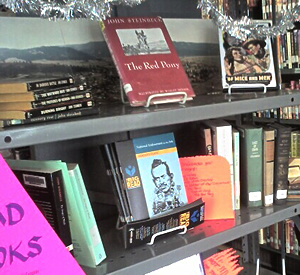The Sunset State
Friday, April 27th, 2007April 27, 2007
Miami, Florida
“And God keeps his appointment with Miami every sundown. Berthed on the east of Biscayne Bay, I can look to the western side, which I never fail to come top-side and do around sunset. Thus I get the benefit of his slashing paint brush all the way…The show is changed every day, but every performance is superb.”
–Zora Neale Hurston, in a winter 1950 letter
Miami has been reading that erstwhile Floridian Ernest Hemingway, not Hurston, but it’s always intriguing when two Big Read authors cross paths. There’ll even be a three-way confluence in Florida next January, when Cynthia Ozick’s largely Miami-set The Shawl joins eight other new books on the Big Read list. What other state boasts three Big Read books/authors, you ask? Answer, as they say, below…
Meantime, my Miami visit got off to a cuddly start with the unmistakable Michelin-man outline of a manatee, floating 17 stories beneath my hotel window and in no particular hurry. I, on the other hand, dashed downstairs to stroke, feed, or otherwise disturb the native fauna. Alas, by the time I got there, nature’s closest approximation of an inflatable pool toy had drifted off down the canal somewhere.
 |
|
Who couldn’t write great literature at a desk like this, with a fishing reel and a stuffed oryx nearby, plus all your visitors safely behind a locked wrought-iron cage? Photo by David Kipen |
Luckily, Alina Interian and Roselyne Pirson of the Florida Center for the Literary Arts drove up around then and spirited me out for a friendly debrief over lunch. Having met them last year during South Florida’s pilot-phase Read of Fahrenheit 451, I knew what to expect: never any apple-polishing, just unalloyed honesty. Alina wasn’t shy about wishing for some newer books on the list, so I was happy to trot out all the new titles for her. Just to be contrary, I started with The Adventures of Tom Sawyer, savoring her mortification before throwing out our first 21st-century novel, Tobias Wolff’s Old School, plus all the others spaced more or less evenly between ‘em.
But at this rate, I’ll never get to the finale of the south Florida Big Read, a bus tour — which turned into a bus caravan, it was so oversubscribed — to Hemingway’s house on Key West. In preparation I’d read not just A Farewell to Arms but To Have and Have Not, Hemingway’s only book set in Florida (or for that matter in the United States, unless you count the Nick Adams stories). William Faulkner and Jules Furthman’s script for the Bogart-Bacall-Hawks movie is more successful as a work of art, but boy is the book underrated. It’s got Hemingway’s best description of deep-sea fishing and his fullest, most ominous meditation on suicide. That’s not Bacall purring “You know how to whistle, don’t you?” but it ain’t hay.
Why waste time comparing apples and oranges, though, when you can eat frozen chocolate-covered Key lime pie on a stick? That was me, nuzzled by Hemingway’s bigger-than-ever army of six-toed cats, planted inside the security cage in the doorway of his second-floor writing study, just basking in the aura. I know it was juvenile, closer to fandom than to literary criticism. But after Hemingway’s Key West author Stuart McIvor’s informative lecture downstairs, we’d had our quota of literary criticism. It was time for a little basking, and I was more than equal to the task.
It all took me back to my first experience with Hemingway. I was in high school, and the teacher (more likely the school district, I now realize) had assigned The Sun Also Rises. The book possessed me so thoroughly that I wound up dragooning two classmates into a woefully underplanned troutfishing expedition into the High Sierra. All I remember now is devouring an entire delicious bagful of Snickers bars, heedless of the worm blood and fish scales on my fingers. That wasn’t literary criticism either, but it did for literature what literature does for life: flavor it, hallow it, light it up with Hurston’s “slashing paint brush” until it becomes something else, something finer.
And speaking of the High Sierra, the first state besides Florida to notch three Big Read books or authors is, you guessed it, California, with The Joy Luck Club, The Maltese Falcon, and at least half of The Grapes of Wrath. When I get to still-unrepresented Utah next month, I may have some explaining to do…

